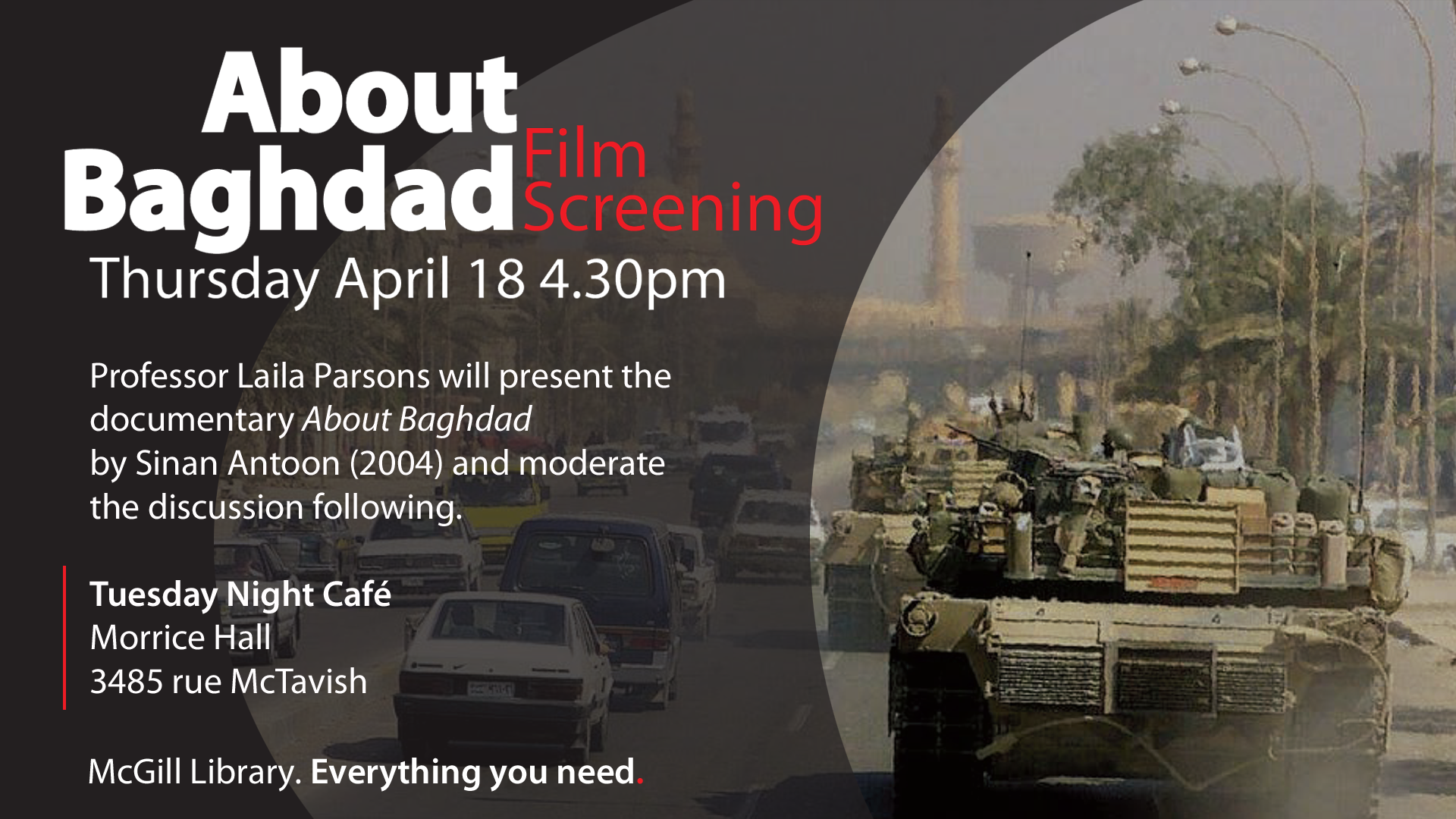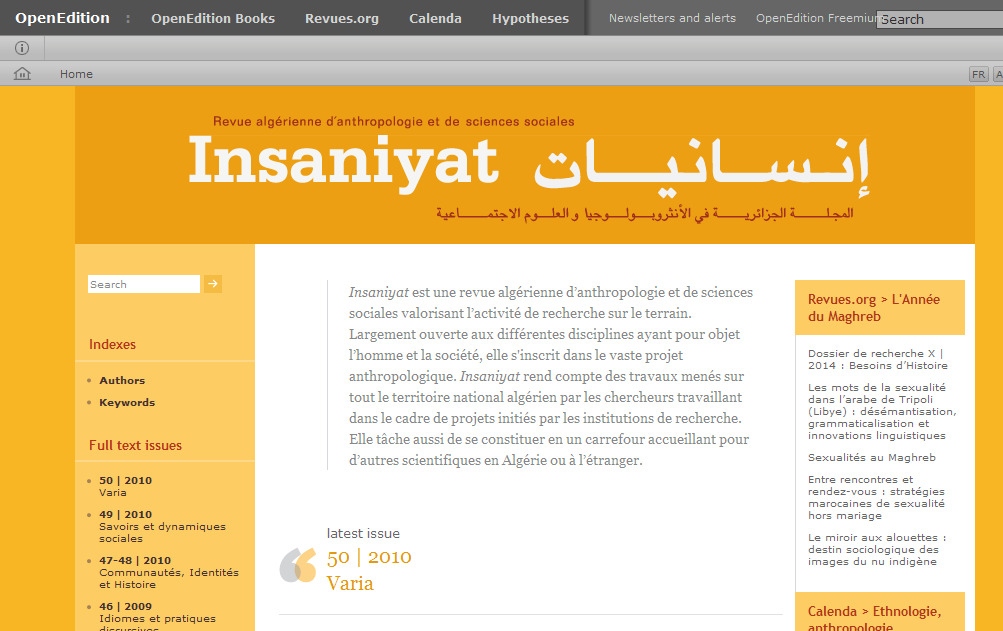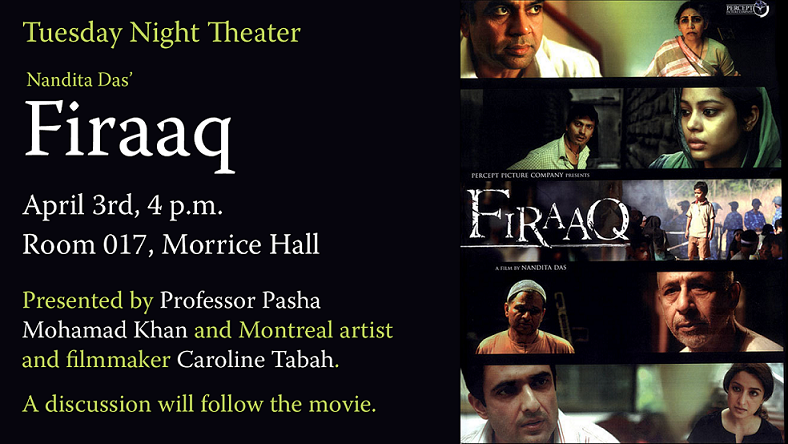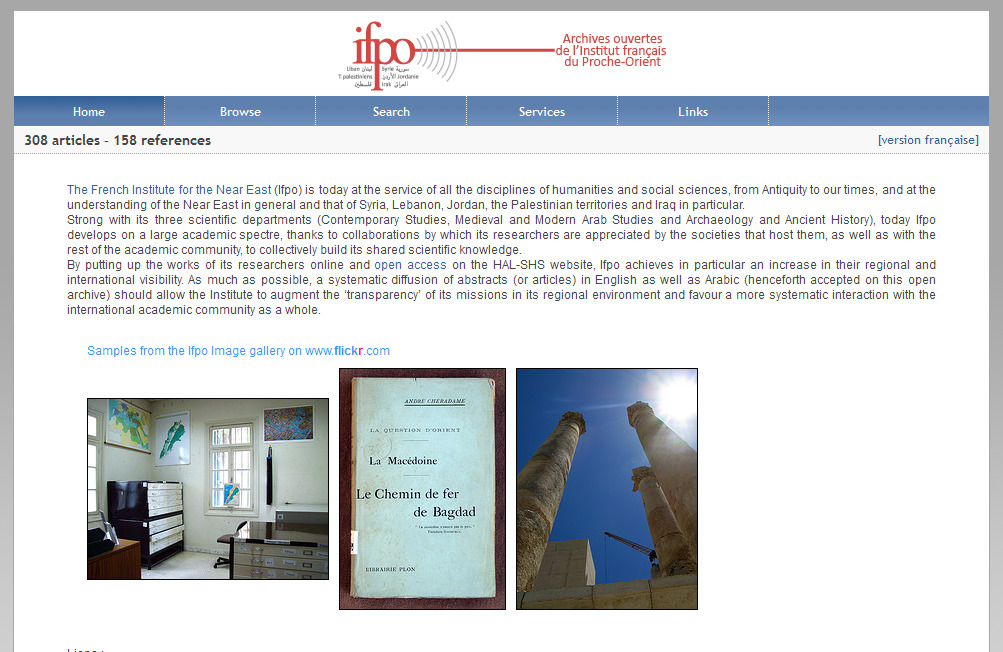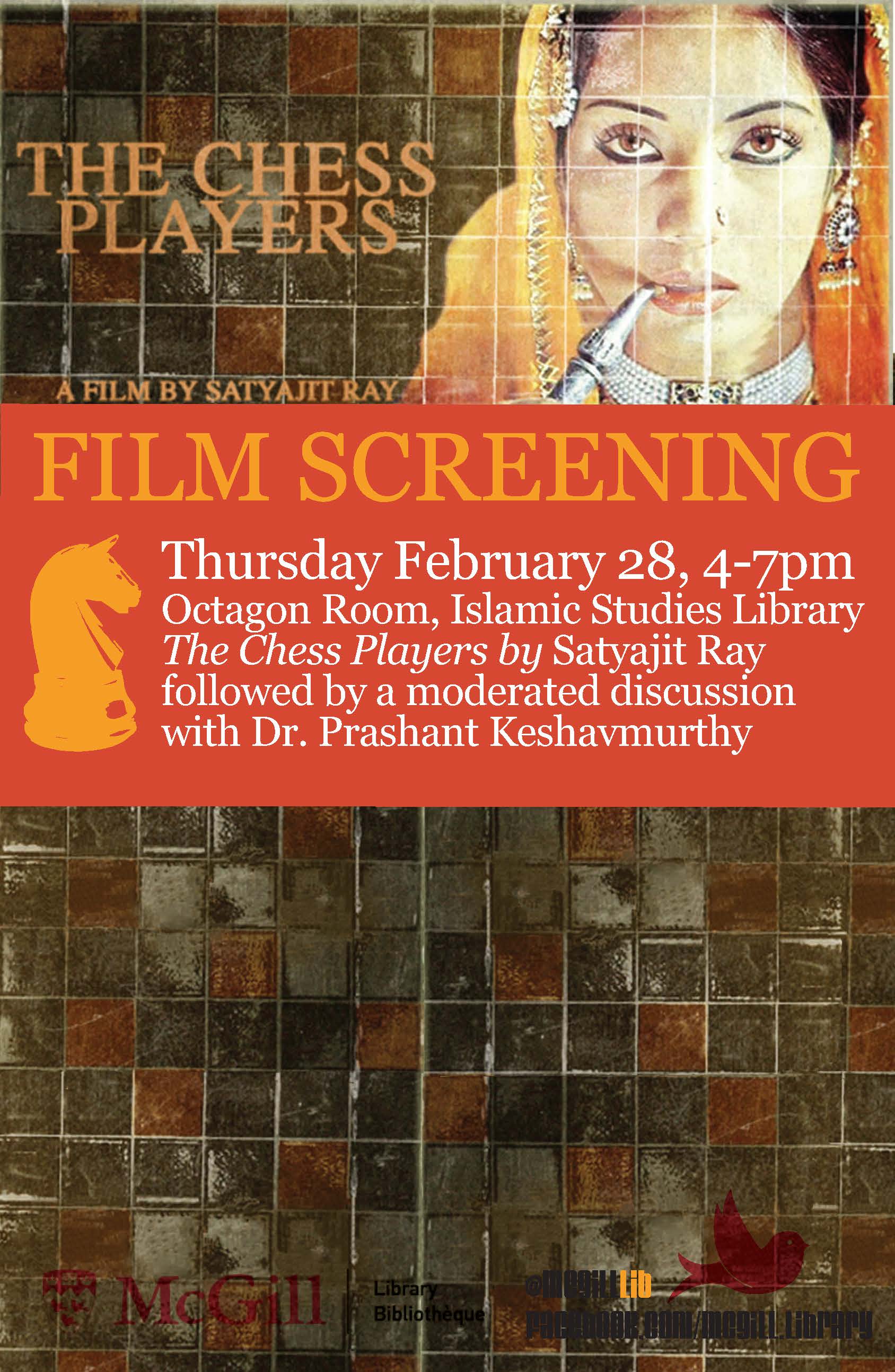Posts By:
Insaniyat : revue algérienne d’anthropologie et de sciences sociales
Film screening @ the ISL on Wed. April 3rd!
Writers’ Panel Discussion on Language, Translation and Travel
Visiting Writers’ Panel Discussion on Language, Translation and Travel with Musharraf Ali Farooqi, Iman Humaydan, and Shahriar Mandanipour
Thursday, March 28th, 2013
Octagon Room, Islamic Studies Library
Morrice Hall, 3485 McTavish St.
6:00 pm
The Institute of Islamic Studies welcomes you to a roundtable panel and discussion with our three visiting writers, Iman Humaydan, Shahriar Mandanipour, and Musharraf Ali Farooqi, whose texts interact in various ways with three languages taught at the Institute: Arabic, Persian and Urdu. Join these writers, along with Institute professors, at the Islamic Studies Library, to take part in an intimate discussion regarding the writing craft, translation, languages, and travel.
Open archives of the French Institute for the Near East (IFPO)
New Digital Collection Documents 45 Years of AUC History
The American University in Cairo is pleased to announce the first installment of the AUC Board of Trustees Meetings Minutes digital collection, available in the Rare Books and Special Collections Digital Library.
The American University in Cairo Board of Trustees Meetings Minutes digital collection primarily includes meeting agendas and minutes, as well as additional documentation such as budgets, correspondence, reports, and memoranda. The collection includes minutes ranging from the first meeting of the Board of Trustees of Cairo Christian University on November 30, 1914 to the American University at Cairo’s meeting on December 19, 1959.
This collection will continue to grow as minutes are digitized.
Islamic unity in the age of ecumenism: Interpreting the importance of the World Muslim Congress
The Chair Islam, Pluralism and Globalization at UdeM will host a lecture tomorrow, March 7 2013, from 5 to 7 p.m., entitled: “Islamic unity in the age of ecumenism: Interpreting the importance of the World Muslim Congress” by Gavin Brockett (Wilfred Laurier University).
The full program is accessible on their website.
Film screening at the ISL on Feb. 28th!
Iraqi academic scientific journals in open access
Press release, Baghdad, Jun 20, 2012
The Ministry of Higher Education & Scientific Research of Iraq is pleased to announce the launch of the new service “Iraqi Academic Scientific Journals” (IASJ).
IASJ is one platform where all scholarly journals published by the Iraqi universities and research institutions are indexed and discovered. All journals in IASJ are peer-reviewed and open access.
The main aim of IASJ is to improve the online discoverability and visibility of and access to the published scholarly research of iraqi academics. IASJ will help Iraqi authors to disseminate their research globally.
At the moment IASJ is launched in a Beta version with only 71 journals published by 18 institutions. The service will be further developed and will cover all journals, more than 200 journals publisher by 40 academic institutions in Iraq.
IASJ is developed and hosted by SemperTool, a company specialized in building digital library products. All content of IASJ will be included in the Iraqi Virtual Library System IVSL and it’s discovery system LibHub provided by SemperTool.
Mali: What really happened to the manuscripts?
Some of you may have been heard about Islamic manuscripts of Tombouctou being burned and destroyed. Some contradictory and confusing information had been coming in for two days*. Well, here is the Tombouctou Manuscripts Project / Huma University of Cape Town update, dated 30 January 2013:
Since the start of this week there are reports about the destruction of library buildings and book collections in Timbuktu. It sounds as if the written heritage of the town went up in flames. According to our information this is not the case at all. The custodians of the libraries worked quietly throughout the rebel occupation of Timbuktu to ensure the safety of their materials. A limited number of items have been damaged or stolen, the infrastructure neglected and furnishings in the Ahmad Baba Institute library looted but from all our local sources – all intimately connected with the public and private collections in the town – there was no malicious destruction of any library or collection.
By Sunday January 27 the Ansar Dine rebels had fled Timbuktu. The French army and its Malian partners entered the town on that day.
One of the first reports on Monday morning out of the town was that a library and books had been set alight. A Sky News journalist, Alex Crawford, embedded with the French forces, reported in the evening from inside the new Ahmad Baba building, which is opposite the Sankore mosque. This building was officially opened in 2009 and is the product of a partnership between South Africa and Mali. It is meant to be a state-of-the-art archival, conservation, and research facility. Images showed empty manuscript enclosures strewn on the floor, some burnt leather pouches, and a small pile of ashes. She reported that over 25,000 mss had been burned or disappeared.
Additional images showed her going down to the vault of the archives and looking at empty display cabinets. No signs of fire could be seen.
The mayor of Timbuktu, Hallè Ousmane, based around 800 km away, in Bamako, was quoted in various media reports that a library building and manuscripts were torched by fleeing rebels. There is no other evidence but the word of the mayor. News spread to international media and the mayor’s words were reported as hard fact.
We tried all of Monday, since these reports appeared, to contact colleagues in Timbuktu but without success. The town was in a communications and electricity blackout since around January 20, we were told by Malian colleagues; no eyewitness reports had been coming out of the town for more than a week at this point.
Sources from Bamako in the evening reported that Mohamed Ibrahim Cissé, President of the Chairman of the Board of the Cercle of Timbuktu still confirmed, on France 24, that the new Ahmed Baba Institute building had been burned by the Ansar Dine before fleeing. By Monday night we finally managed to contact our colleague, Dr Mohamed Diagayeté, senior researcher at the Ahmad Baba Institue, now based in Bamako. He heard much the same reports that we heard.
However, he added that the majority of the mss. of the Institute was still stored in the old building – opened in 1974 and on the other side of the town, from the new building. He told us that the latest news about the new building, as of eight days before the flight of the Ansar Dine, was that the building had not been destroyed. He said that around 10,000 mss had been stored in the new building since there was no more space for the mss in the old building. They were placed in trunks in the vaults of the new building. Upstairs, where the restoration was taking place and boxes were made there were only a few mss. After seeing Sky News footage, he says that the images were of the few mss upstairs waiting to be worked on by the conservators.
However, by Tuesday morning, Dr. Mahmoud Zouber, Mali’s presidential aide on Islamic affairs and founding director of the Ahmad Baba Institute, told Time, that before the rebel take-over the manuscripts: “they were put in a very safe place. I can guarantee you. The manuscripts are in total security.”
Finally, the journalist Markus M. Haeflinger, writing in Neue Zuercher Zeitung this morning, reports on his interview with the previous and present directors of the Ahmad Baba Institute in Bamako, on how the larger part of the Ahmad Baba collection was hidden and even transported out of Timbuktu during the crisis.
The protection of the cultural and intellectual heritage of this region needs to be enhanced and promoted. The abandonment of the security of Timbuktu nine months ago, the flight of archivists and researchers, and the closure of libraries should not be repeated. We remain in contact with our colleagues in Mali and are keen to establish precisely which manuscripts were damaged, destroyed, or stolen.
*See the links below:
http://resources3.news.com.au/images/2013/01/30/1226564/952943-mali.jpg [PHOTOS]: Burnt ancient manuscripts at the Ahmed Baba Centre for Documentation and Research in Timbuktu, Jan. 28-29, 2013
http://www.bbc.co.uk/news/world-africa-21251444 [includes VIDEO footage from inside the Centre]
http://www.rferl.org/content/mali-tumbuktu-islamic-manuscripts-militants-destruction/24887300.html
http://dailymaverick.co.za/article/2013-01-30-timbuktu-what-really-happened-to-the-manuscripts
http://www.bbc.co.uk/news/world-africa-21248951


